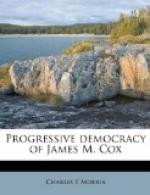“The Republican candidate has spoken and his utterance calls forth the following approval from Senator Johnson:
“’Yesterday in his speech of acceptance Senator Harding unequivocally took his stand upon the paramount issue in this campaign—the League of Nations. The Republican party stands committed by its platform. Its standard-bearer has now accentuated that platform. There can be no misunderstanding his words.’
“Senator Harding, as the candidate of the party, and Senator Johnson are as one on this question, and, as the latter expresses it, the Republican party is committed both by platform in the abstract and by its candidate in specification. The threatened revolt among leaders of the party is averted, but the minority position as expressed in the senate prevails as that of the party. In short, principle, as avowed in support of the Lodge reservations, or of the so-called mild reservations, has been surrendered to expediency.
“Senator Harding makes this new pledge of policy in behalf of his party:
“’I promise you formal and effective peace so quickly as a Republican congress can pass its declaration for a Republican executive to sign.’
“This means but one thing—a separate peace with Germany!
“This would be the most disheartening event in civilization since the Russians made their separate peace with Germany, and infinitely more unworthy on our part than it was on that of the Russians. They were threatened with starvation and revolution had swept their country. Our soldiers fought side by side with the Allies. So complete was the coalition of strength and purpose that General Fochs was given supreme command, and every soldier in the allied cause, no matter what flag he followed, recognized him as his chief. We fought the war together, and now before the thing is through it is proposed to enter into a separate peace with Germany! In good faith we pledged our strength with our associates for the enforcement of terms upon offending powers, and now it is suggested that this be withdrawn. Suppose Germany, recognizing the first break in the Allies, proposes something we cannot accept. Does Senator Harding intend to send an army to Germany to press her to our terms? Certainly the allied army could not be expected to render aid. If, on the other hand, Germany should accept the chance we offered of breaking the bond it would be for the express purpose of insuring a German-American alliance, recognizing that the Allies—in fact, no nation in good standing—would have anything to do with either of us.
“This plan would not only be a piece of bungling diplomacy, but plain, unadulterated dishonesty, as well.”
“No less an authority than Senator Lodge said, before the heat of recent controversy, that to make peace except in company with the Allies would ’brand us everlastingly with dishonor and bring ruin to us.’
“And then after peace is made with Germany, Senator Harding would, he says, ’hopefully approach the nations of Europe and of the earth, proposing that understanding which makes us a willing participant in the consecration of nations to a new relationship.’




